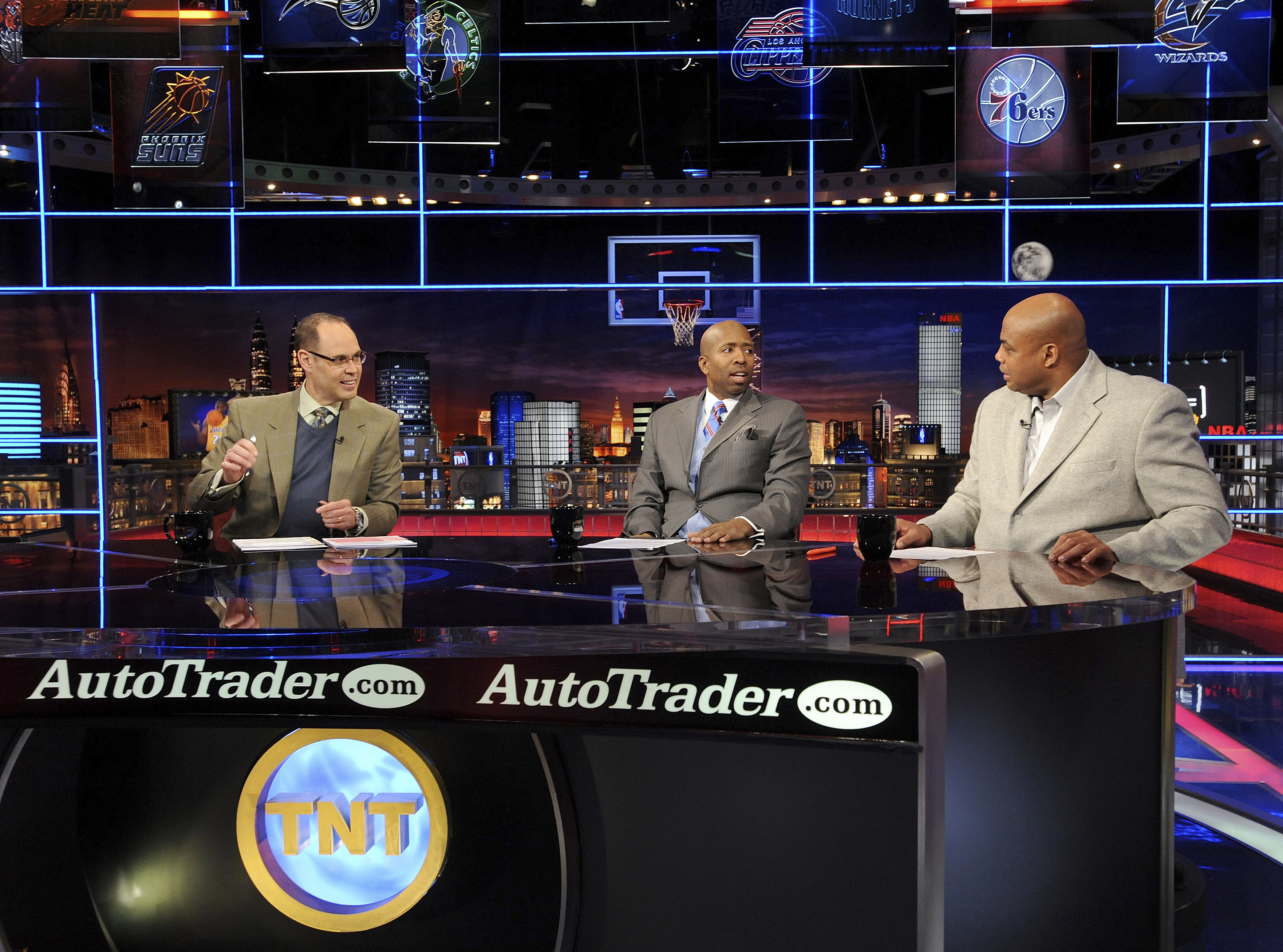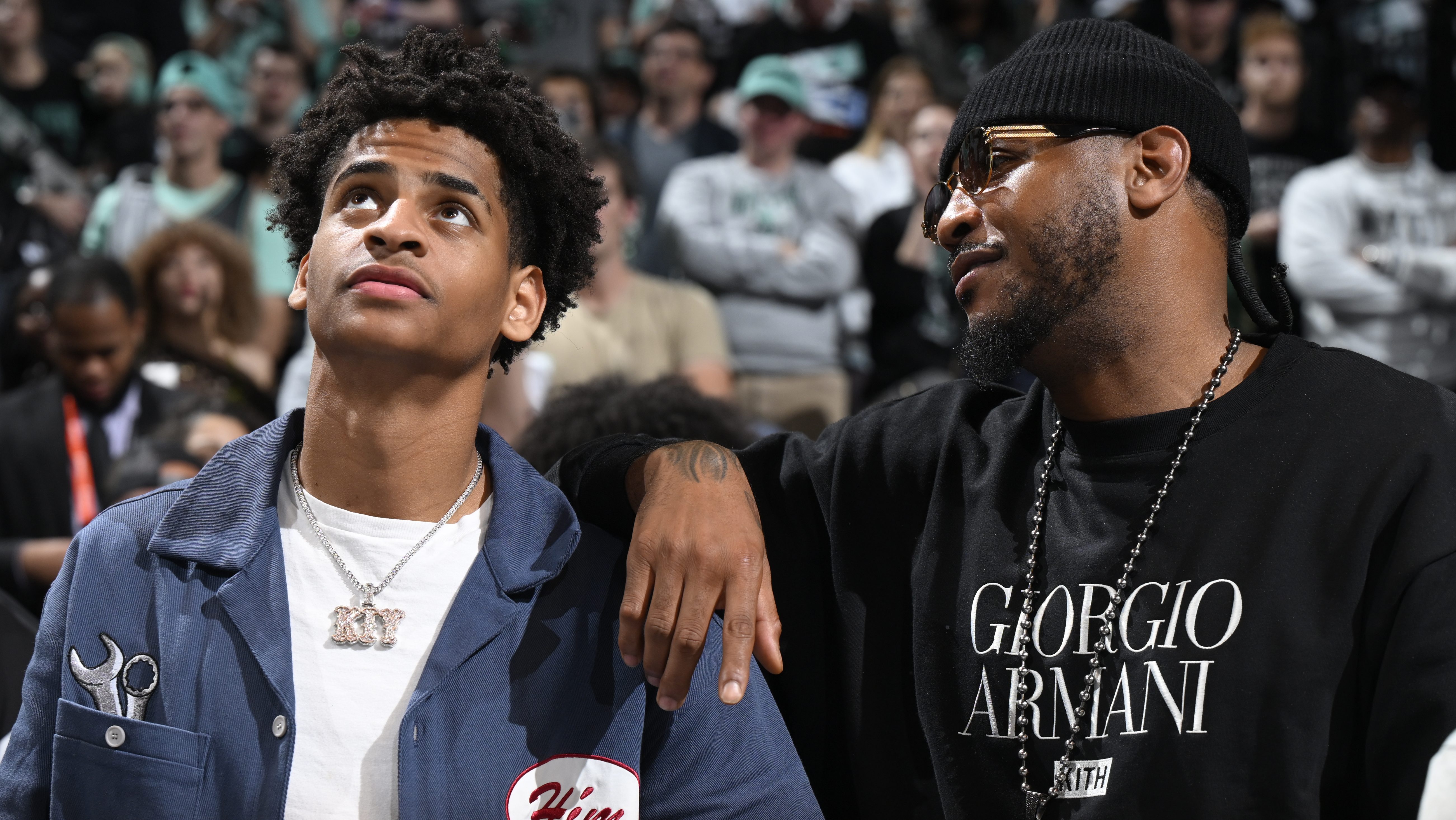
The red light on John Tesh’s answering machine was blinking.
With the press of a button, a cassette tape began to roll and a message that would go on to change his life started to play.
That message was from himself.
“Hi, this is a message for me about the NBA theme,” Tesh said on his answering machine while calling his house in 1989. “Here’s an idea. It goes like this: “Bada-da-da-da-da—da—da…”
That melody went from his answering machine to television screens across the world, before permanently settling in the hearts and minds of many basketball fans as the anthem of the sport.
It was the origin of the song “Roundball Rock,” which Tesh estimates was played roughly 12,000 times during game coverage as the NBA on NBC theme from 1990 to 2002.
NBA
The idea for the song came to him while he was asleep in another country.
The host of “Entertainment Tonight” at the time, Tesh had taken a month off from the show to cover the Tour de France.
There, he learned NBC was looking for a theme for its NBA coverage, having recently acquired the broadcast rights from CBS. Tesh, a lifelong musician who already had composed themes for the NFL, Tour de France and other sports, immediately began stringing notes together.
“I was trying to put ideas into my subconscious brain,” Tesh, 71, told NBC during a recent phone interview. “What would a basketball theme sound like?”
He first heard that sound at 2 a.m., the future basketball theme waking him like the music of an alarm clock. He refused to hit the snooze.
“I knew if I went back to sleep, the theme would be gone, the idea would be gone,” he said. “There was no keyboard, no tape recorder, no cell phones. So, I called my answering machine and left a message for myself.”
The NBA on NBC theme debut: ’That’s my song’
Tesh entered an airport sports bar in Atlanta and took a seat shortly before opening tip.
The Los Angeles Lakers were playing the host San Antonio Spurs in NBC’s first NBA broadcast of the season on Nov. 3, 1990.
More than a year prior, Tesh had returned home, retrieved his message and reported to the studio.
“I don’t know how many were sending theme ideas, but I wanted to be the first one in,” he said.
Tesh assembled a full orchestra to complement the song’s piano, bass, drums, and guitar. He increased the pace of the song to around 120 beats a minute to match the average dribble rate of a basketball fast break. He added a musical bed that played beneath dramatic pregame montage narrations by Marv Albert and Bob Costas.
He conducted the soundtrack to the careers of Michael Jordan, Hakeem Olajuwon, Shaquille O’Neal, and other NBA stars of the era.
“I knew you needed a fanfare, then you needed a second movement and then you needed a bed without any melody in it where Marv Albert could talk about this and that,” Tesh said.
He sent the theme to NBC executives, not as a demo, but as a finished product. It arrived not on cassette, but on a VHS tape, with the song played over highlights of the 1988 NBA Finals.
“I took any problem with imagination out of the mix so they could actually see it fully formed,” Tesh said. “When I got the call, it was like, ‘Hey, this works!’ I don’t even think I was competing with anybody. This was the first thing they saw.”
Now it was time for basketball fans to see it.
Tesh watched from the crowded bar as the intro to the game began. Narrated by Albert, the pregame montage mixed highlights and interviews with Lakers star Magic Johnson and Spurs center David Robinson.
“The Lakers have brought their Magic to Mr. Robinson’s neighborhood,” Albert said before the video faded to black.
Colorful lasers then etched the outline of NBC’s Peacock logo as Tesh’s theme began, its trumpeted opening and timpani roll giving way to the now very familiar orchestral melody of “Bada-da-da-da-da—da—da…”
“I motioned for the bartender to come over and I said, ‘Hey, you hear that? And he goes, ‘What?’ I said, ‘That song.’ He goes, ‘Yeah.’ I said, ‘That’s my song. I wrote that.’ And he says, ‘Great. Can I get you another beer?’ I was the only one in the place who was actually excited about what was going on.”
Who wrote the NBA on NBC theme?
It was like a band hearing its song on the radio for the first time.
It set Tesh — a journalist whose first love was always music — on a path in which he sold millions of records, earned two Grammy nominations and returned to the stage as highlighted by his Live at Red Rocks PBS special.
“It definitely launched my music career,” he said.
Tesh began learning trumpet and piano while in elementary school on Long Island, New York. He later played trombone in a Blood, Sweat & Tears cover band called The Best of Both Worlds. They became entangled in a high school rivalry with another local band called The Hassles, who had a keyboardist named Billy Joel.
“I thought it was a rivalry, he did not,” Tesh said of the legendary Piano Man. “If Billy didn’t want the gig, then we got it. He was like Coca Cola and we were RC Cola.”
Tesh was expecting to go to music school until his father told him he would “starve to death” and sent him to North Carolina State to study textile chemistry. While there, he enrolled in a radio and television course hoping to boost his GPA.
“I got bit by that bug,” Tesh said.
He attempted to drop his courses to switch majors, but because it was past the drop-add deadline, his statistics professor wouldn’t allow it.
“I pleaded with him, he said no,” Tesh said. “I took the advice of one of my fraternity brothers and I signed the professor’s name to the drop-add card. And it was OK for a while until he checked.”
Tesh was suspended indefinitely, and his father kicked him out of the house.
“So, I was homeless for a while, living in the park in Raleigh,” he said.
Working construction, he begged his way into a radio station and said he got a job sweeping the floors. When a newscaster didn’t show up for work one day, Tesh filled in and was offered a job reading the news on weekends. He advanced his career with jobs in Durham, Orlando and Nashville, where he anchored the news alongside weatherman Pat Sajak and across the street from the competing station’s reporter, Oprah Winfrey.
A year and a half later, Tesh was hired by CBS News in New York.
“From the point I was homeless to the point I was in the same newsroom as Bill O’Reilly as a 23-year-old was 36 months,” said Tesh, who went on to co-host “Entertainment Tonight” from 1986 to 1996. “Somebody once wrote the velocity of what happened to me had never happened in the media business.”
Five years into the job, CBS Sports asked him to cover anthology sports like downhill skiing, figure skating and the Tour de France.
“A lot of those events needed background music and themes,” Tesh said. “My basement was filled with synthesizers, so before I went out to these events I would write these themes and give them to the producers.”
While on assignment in France in 1989, he was told a theme was needed for NBC’s basketball coverage.
‘Ba-ba-ba-ba-ba-basketball’
Tesh said the theme’s popularity surged after the NBA on NBC era, like a former chart topper that’s most appreciated years later when it evokes nostalgia.
“Not until it left NBC and people started learning how to play it on YouTube did it become sort of the theme for the halcyon days of basketball,” he said. “It became what it is after it was on the air.”
Tesh was at a restaurant in Los Angeles in 2013 when his cellphone began to light up with text messages and phone calls.
“I went to the bathroom and looked at my phone, my friend is saying, ‘Are you OK with this? Oh, my God. I’m so sorry.’ Stuff like that,” he said.
John Tesh and “Roundball Rock” had just been parodied on “Saturday Night Live.”
Jason Sudeikis played Tesh, dressed in his concert attire, and Tim Robinson played Tesh’s fictional brother, Dave. The duo pitched the theme to NBC executives played by Vince Vaughn, Kenan Thompson and Kate McKinnon – unofficially adding lyrics to the song.
"Ba-ba-ba-ba-ba-basketball, gimme gimme gimme the ball, 'cause I'm gonna DUNK IT!" Robinson sang while Sudeikis emphatically played the keyboard.
“I watched it with my wife, and I was going, ‘This is the coolest thing that could ever possibly happen to me!’” Tesh said. “People believe I have a brother named Dave, which I don’t. I don’t have a brother at all. But now the song has words: ‘Ba-ba-ba-ba-ba-basketball…”
The sketch — along with “Roundball Rock” having its own Wikipedia page — was evidence of the staying power, mainstream crossover and endless relevance of a theme that had not been on the air regularly in more than a decade.
The theme did return to basketball broadcasts in 2019 when FOX acquired the rights from Tesh for its college basketball games. But …
“I got all these complaints from people who were like, ‘This is not right! This shouldn’t be on college basketball. Take it off! This is for the NBA!’” Tesh said. “I got into one of those Reddit threads and I said, ‘Hey, pardon me, but I’ve got some grandkids I’d like to buy birthday presents for.’”
Will the NBA on NBC theme return?
The phone rang again recently, but this time, it wasn’t Tesh calling himself. It was NBC.
He was asked if the network could use the theme for basketball coverage during the 2024 Paris Olympics, as the network had done for previous Games. The call came amid the NBA broadcast rights negotiations, which sparked speculation about a potential return to NBC.
“The guy who called me said, ‘Hey, we don’t know what’s going to happen with the rights, but are you free and clear if we want to use the theme?’” Tesh said. “So, we stand at the ready. We’d love to be a part of coming back home to NBC.”
Tesh, who continues to do concert tours and host his internationally syndicated radio show, is scheduled to go to Nashville this month to re-record the theme.
“We’re going to do the original version just with a larger orchestra,” he said, “cause if we change one note, people will kill me.”
The latest recording will come roughly 35 years after the first version was taped on an answering machine. It marked Tesh’s debut performance of a theme that would become the musical accompaniment to championship three-peats by both Michael Jordan and Kobe Bryant, and many of the NBA’s most memorable moments in between.
“Ever since that one answering machine message struck gold, I've been singing melodies into recording devices, which now include my smartphone. But it's just not the same,” Tesh said. “There was something magical about that goofy little cassette tape in the answering machine.”



